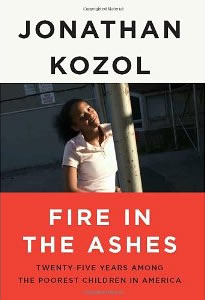Book Notes
 Jonathan Kozol, Fire in the Ashes; Twenty-Five Years Among the Poorest Children in America (New York: Crown), 354pp.
Jonathan Kozol, Fire in the Ashes; Twenty-Five Years Among the Poorest Children in America (New York: Crown), 354pp.
For the last fifty years, the activist-writer Jonathan Kozol (b. 1936) has worked with the poorest children in America, and in a dozen books told their stories. His first book, Death at an Early Age, won the National Book Award. His newest book tells the stories of children he followed from the South Bronx neighborhood of Mott Haven (the poorest congressional district in the nation), especially through the programs run by The Rev. Martha Overall of St. Ann's Episcopal Church. He met most of these kids beginning in 1985, and now it's been twenty-five years. What has come of them?
In Kozol's view, our country tolerates nothing less than educational apartheid. One social worker described the Martinique Hotel, where many of Kozol's children grew up, as "New York City's midtown death camp for the spirits of poor children." When asked if he was offended by this comment since he was a Jew, Kozol said he thought it was a just comparison. These children live in rat-infested places that are run by criminal landlords. Some places don't even have running water. These people know chronic hunger. Their schools are over-crowded, often have no text books, have high teacher turnover, and graduation rates of about twenty-five per cent. They must interact with erratic and dysfunctional government agencies that have complex rules.
As you would expect for any human being who grew up in such conditions, these families struggle with poor health, broken wills, bad decision-making skills, feelings of helplessness, and rampant criminality. Kozol's story-telling cuts through rhetoric and ideology to introduce us to his kids and their environment. Nor does he romanticize — there are plenty of kids sent to prison, suicide, evictions, heroin overdose, and family violence. Still, while he describes how and why these children are so vulnerable, there's no patronizing pity; he also celebrates their "nearly indestructible" resilience against all odds. Alice, for example, "absolutely refused to succumb to the passivity" of victimhood. Leonardo, Pineapple, and Jeremy went to college. A blurb on the back cover by Elie Wiesel gets it right: "What Kozol says must be heard. His outcry must shake our nation out of its guilty indifference."


